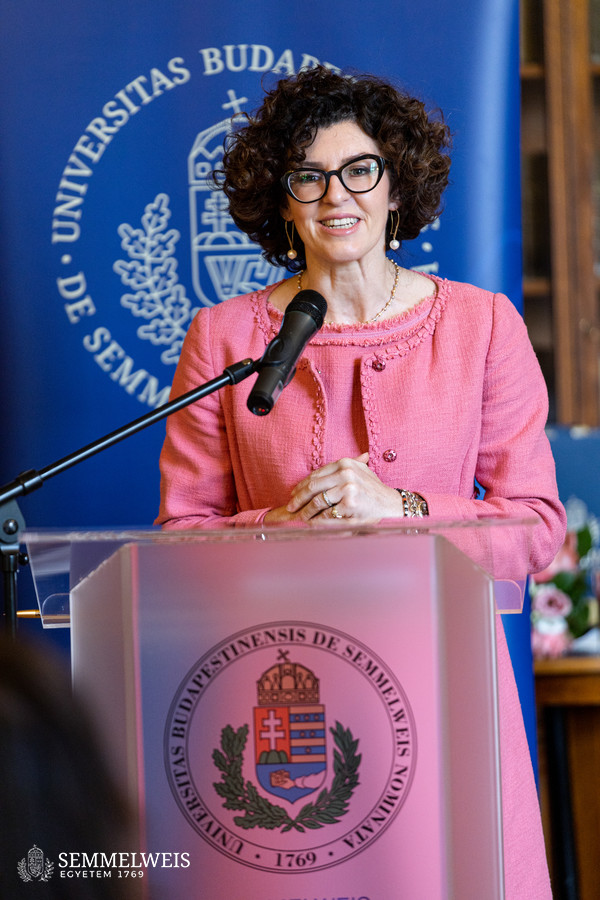Semmelweis University and Roche Sign Strategic Agreement

Dr. Béla Merkely, rector of Semmelweis University.
A landmark agreement has been signed between Semmelweis University, the top medical and health sciences higher education institution in Hungary, and the local unit of Swiss multinational Roche, a leading healthcare company in biotechnology and diagnostics.
The main areas of the agreement, which aims to improve the quality of life of patients significantly, include the expansion of innovation projects and clinical trials in Hungary. The expectation is that the strategic cooperation between Semmelweis University and Roche Hungary will trigger significant advances in joint research and development activities in oncology, hematology, immunology, neurology, and ophthalmology, among others.
Support for education, sharing of international experience, and developing domestic practices will all play an essential role in the joint work, which will focus on personalized medicine, value-based healthcare and data-driven healthcare decision-making.
The agreement builds on past work. Over the past five years, Roche has conducted around 70 clinical trials in various disease areas in collaboration with the university.
“To create a patient-centered and more sustainable healthcare system, leading-edge professionals in science and healthcare need to work together, which is why we are building a partnership with Semmelweis University that will bring radical change for patients and healthcare providers,” said Raffaella Claudia Bondi, CEO of Roche Hungary.
She added that the parties are united by a vision for a major breakthrough in healthcare, a passion for science, and a belief that a lasting partnership based on shared values and focused on the whole patient journey is the key to improving the health of the population and healthcare indicators in Hungary.
“I believe it is of particular importance that all elements of the document are characterized by a patient-centered approach, aiming to deliver efficient and high-quality care and improve the quality of life of our patients. This contributes to the main mission of our university, which is to improve the health of our citizens,” noted Dr. Béla Merkely, rector of Semmelweis University.

Raffaella Claudia Bondi, CEO of Roche Hungary.
Innovative Therapies
He emphasized that increasing the volume of clinical trials will help ensure patients have access to innovative therapeutic options as soon as possible and that researchers and doctors are among the first to gain experience with new procedures.
“The partnership will also help support research initiated by Semmelweis University clinics, which will strengthen our scientific achievements and contribute to our goal of becoming one of the top 100 universities in the world and one of the top five medical universities in Europe,” Merkely added.
Breast cancer is one of the most critical areas of clinical trials. In Hungary, more than 8,000 cases are diagnosed and at least 2,000 people die from the disease each year, accounting for 6.7% of all cancer deaths. Within the collaboration framework, the university and the company are looking to bring significant advances in breast cancer treatment. In developing new directions, the parties are also counting on the involvement of patient organizations in the field.
The joint efforts of the parties in neurology and neurogenetics are another priority. Current research is looking into areas such as Alzheimer’s disease, for which no breakthrough has yet been found. In Hungary, it is estimated that between 150,000 and 500,000 people could be affected by Alzheimer’s, for whom early detection is critical.
There is also a decade-long collaboration between two pathology institutes at Semmelweis University to research the causes of lung tumors. More than 8,000 patients die of lung cancer in Hungary annually, so reducing this number and improving the quality of life of those with the disease are also key objectives of the cooperation.
The discovery of oncogenic mutations leading to tumors and their targeted therapy has opened a new dimension in treating lung cancer. Knowledge of these genetic variations can be used to tailor disease treatment and thus increase efficacy through biomarker-based therapeutic design.
Patient Pathways
Semmelweis University is also testing a web application within each of its disease groups to develop and operate a digital patient management system. The app was donated to the Hungarian state by the Hungarian Foundation for the Development of Personalized Healthcare (SzEFA), established by Roche, in December 2021.
Integrating this solution into the university’s hospital IT systems can significantly reduce the administrative burden. In the medium-term, patient pathways can become more transparent diagnosis times can be shortened.
The joint project will also aim to improve healthcare organization and use digitalization to help doctors make faster, better decisions based on all the available data, taking into account the whole patient journey. It will also allow more time for quality interactions between doctors and patients.
To improve patient safety, the university will set up a digitalized cytostatic (a process that aims to retard cellular activity and multiplication) mixture infusion laboratory based on CATO (Computer-aided Therapy for Oncology) with the support of Roche this year. The lab will be used for more automated, controlled, safer and patient-tailored creation of individual formulations for oncology treatments.
The centralized preparation will also optimize the use of equipment, medicines and resources, thus contributing to more cost-effective operations, in addition to improving patient safety.
The cooperation agreement was signed by Merkely and Dr. Lívia Pavlik, the chancellor of Semmelweis University, and by Bondi and Tibor Kövesi, head of strategy and organizational development, on behalf of Roche.
This article was first published in the Budapest Business Journal print issue of June 17, 2022.
SUPPORT THE BUDAPEST BUSINESS JOURNAL
Producing journalism that is worthy of the name is a costly business. For 27 years, the publishers, editors and reporters of the Budapest Business Journal have striven to bring you business news that works, information that you can trust, that is factual, accurate and presented without fear or favor.
Newspaper organizations across the globe have struggled to find a business model that allows them to continue to excel, without compromising their ability to perform. Most recently, some have experimented with the idea of involving their most important stakeholders, their readers.
We would like to offer that same opportunity to our readers. We would like to invite you to help us deliver the quality business journalism you require. Hit our Support the BBJ button and you can choose the how much and how often you send us your contributions.








